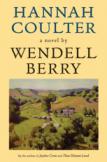Kentucky Widow Remembers
When Wendell Berry came to Seattle to read from his new novel, Hannah Coulter, he was introduced with the words, “For those of you who wonder where hope still lies....” The audience responded with rapt silence, as if to say, “Yes, we are eager for hope.” Berry’s novel does not disappoint in this respect, providing complex encouragement for discouraging times.
This is the same kind of encouragement many readers have discovered recently in Marilynne Robinson’s remarkable bestseller Gilead. Robinson and Berry both decided to employ an elderly narrator of the opposite gender. In Gilead a 76-year-old preacher, John Ames, spins out spiritually inspired letters to his young son. Berry employs a female narrator, Hannah Coulter, a woman in her 80’s who has spent her entire life in Port William, Ky. Both narrators offer powerful spiritual reminiscences about their lives.
Hannah has appeared as a character in Berry’s earlier novels, going back to 1960, and in interviews he has stated that her voice has remained with him over the years. It’s easy to see why. She is a truth-teller, a survivor, a saint of everyday holiness. In this seventh novel of his Port William series, Hannah gets to tell her life story, recalling an era of real neighborhoods, when backyards flowed together because there were no fences. The novel’s setting in a time before pollution and eco-depression may occasionally strike the reader as an escapist fantasy; when Hannah reports “a strange feeling of peace would come over me as if from another world,” the reader may think, yes, surely this is not our world.
Yet in a deeper sense, of course, it is exactly our world. What might appear at first to be Hannah’s insularity eventually emerges as the disciplined detachment of the philosopher-sage. Hannah plays the role of a Delphic oracle transported to rural Kentucky, where she enunciates an ecological spirituality. She confides, “What I like about the woods, what is consoling, is that usually nobody is working there, unless you would say that God is.”
While Port William seems at times preserved in amber, uncomplicated (and un-enriched) by ethnic diversity, traffic, television or other markers of contemporary American culture, it does have one provocative similarity to our current situation. Hannah is a war widow and the spouse of a husband traumatized by war. Her first husband, Virgil, disappeared among the battlefields of World War II, leaving her to raise a daughter as a single parent until she meets and marries Nathan Coulter, an ex-soldier who suffers the post-traumatic effects of war. For Nathan, Port William represents a sanctuary: “It was what he had learned to want in the midst of killing and dying, terror, cruelty, hate, hunger, thirst, blood, and fire.” In this novel love is at war with war, seeking to dispel long shadows cast into the postwar period.
Death, whether from war or from natural causes, is the great intruder in Port William, jolting the town’s interpersonal foundations at regular intervals. Near the end of the novel Hannah concludes, “Death is a sort of lens, though I used to think of it as a wall or a shut door. It changes things and makes them clear. Maybe it is the truest way of knowing this dream, this brief and timeless life.” Hannah lives out of gratitude purified by grief: “And so an old woman, sitting by the fire, waiting for sleep, makes her reckoning, naming over the names of the dead and the living, which also are the names of her gratitude.”
Berry’s own gratitude for language comes through as a driving force in the novel. He salts his narrative with snippets of folk wisdom or foolishness. For example, “Anytime an eighteen-year-old boy tells you not to worry, you had better worry.” When Burley Coulter pronounces, “All women is brothers,” he gives the impression that he may well have uncovered a previously undetected global conspiracy. Berry good-naturedly conveys the domestic insights of small-town life.
If read rapidly, this novel is likely to frustrate. Perused at a slower pace, however, the novel yields one of its major rewards, a sense that we can find in literature an antidote to our hurry-sickness. Slower is better. Berry’s prose style has an incantatory quality, perhaps because he is first and foremost a poet. The novel has chapter titles that could well be the titles of poems: “What We Were,” “The Room of Love,” and “Next.”
Berry also conveys a persuasive sadness about a lost way of life in rural America. A generational and cultural split is made obvious when Hannah’s son Mattie leaves farming to become “M. B. Coulter,” the C.E.O. of “an information-processing company whose name is made of letters that don’t spell anything.” Berry deplores the movement from “the world of membership” to “the world of organization,” where letters no longer add up to meaningful words.
Hannah concludes her story in 2001, bringing us to our own anxiety as to whether we are on the verge of blessing or calamity. Animating her narrative is a biblical hopefulness, sometimes expressed in the words of St. Paul, at other times expressed in motifs such as the return of the prodigal son. We live in the time of a different war, but Berry invites us to share the same mixtures of hope and fear, grief and gratitude that Hannah articulates so well.
This article also appeared in print, under the headline “Kentucky Widow Remembers,” in the March 21, 2005, issue.








